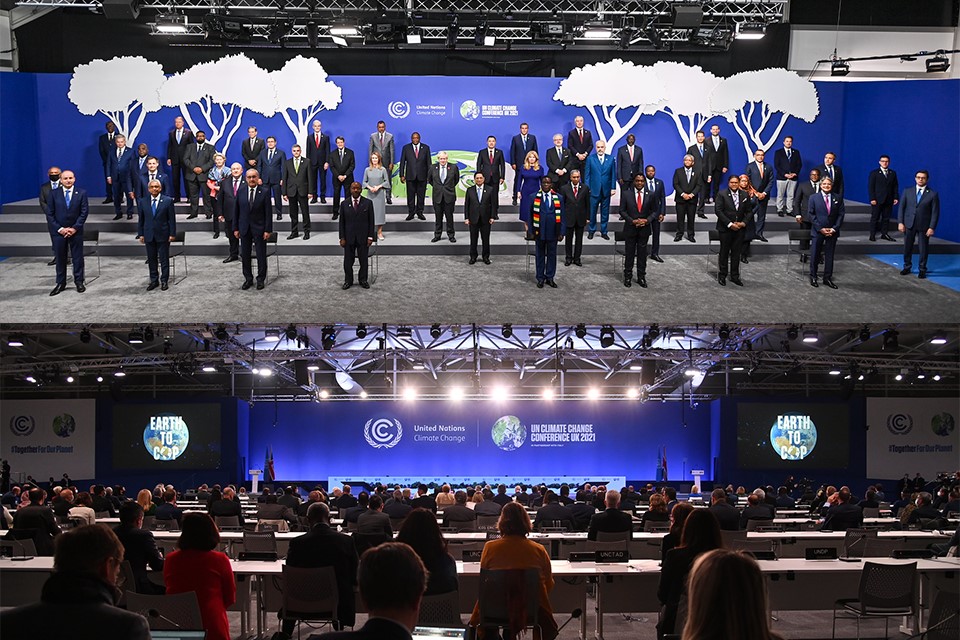
Article Author: Rebecca Goodman
If we look at Glasgow from a glass half full perspective, the Pact is forward progress – signed by 197 countries, and technically the first climate agreement to include ‘coal usage reduction’ by name.
Understandably so, the perceived failures of COP26 have quickly become a rallying call for stronger climate action.
Many have pointed to a minor revision in the language that revised “phase out” coal to “phase down” late in the negotiations as a core failure.
But we remain optimistic that the Agreement embodies a commitment to re-visit emission reduction plans in 2022 to try to keep the 1.5 °C Paris Agreement target achievable.
Over the past year we have seen that no region in the world is unscathed by climate change, particularly the Global South as evidenced by drought, extreme weather events, and food insecurity. When countries are disproportionately impacted, it becomes a matter of global climate justice.
While African countries consume just a tiny fraction of the world’s fossil fuels, their vast ecological wealth and unique natural ecosystems are more susceptible to shifts in weather patterns and indirect impacts from human behavior, including illegal hunting, human-wildlife conflict, and destructive agriculture practices.
As conservationists and scientists, we believe that reaching an agreement to limit greenhouse gas (GHG) emissions and burning fossil fuels is absolutely critical to achieving global health goals and preventing more biodiversity loss that we simply cannot afford in Africa, and on Earth.
Are we on the right track? Cautiously, yes, I think we are on the right track. But there is a lot more to be said about what was accomplished early at COP26, in the shadow of the more tentative commitments within the Glasgow Climate Pact.
As a network, our Africa Biodiversity Collaborative Group (ABCG) members have a huge stake in some of the less visible, but still notable, victories. From our vantage point, we applaud: The ‘Action on Forests and Land Use,’ as an encouraging commitment by governments and the private sector to conserve forests and promote sustainable land-use worldwide.
More than 130 world leaders committed to reversing forest loss and land degradation by 2030. Benefitting Africa directly, 5 governments and 17 private foundations pledged the $1.7 billion to protect the forests of the Congo Basin, home to the second-largest tropical rainforest in the world, and significant for tackling the climate crisis and sustainable development in the region.
Further, 14 countries and philanthropic donors also pledged a minimum of $1.7 billion from 2021 to 2025 to advance Indigenous Peoples’ and local communities’ (IPLC) forest tenure rights and support their role as guardians of forests and nature.
The Climate Pact also brought together CEOs from 30 financial institutions with over $8.7 trillion in assets under management who committed to eliminate investment linked to agricultural commoditydriven deforestation. In addition, more than 80 countries signed up to a global methane pledge, agreeing to cut emissions of the more potent greenhouse gas by 30% by 2030.
Overall, there are now new opportunities for countries to deliver on what they know must be done to avoid a climate catastrophe.
But unless they sharply pivot to implementation and show substantial results, they will continue to have their credibility challenged.
We strongly believe that the UN Climate Change Conference and subsequent meetings are necessary and worthwhile to helping achieve some of ABCG’s biggest objectives, including mainstreaming biodiversity considerations into economic development at the community level in African countries, reaching women and youth. We are particularly encouraged by private sector commitments, as well as climate financing, pledged to advance the roles and rights of indigenous peoples and local communities.
We believe that, in Africa, we need to dramatically increase support for community-led conservation, a model through which communities are supported to more sustainably manage their natural resources for the benefit of both people and nature. Equipping communities with additional natural resource management capacity and opportunities for improved livelihoods from conservation can improve habitat, reduce carbon emissions from deforestation, and boost communities’ resilience to the effects of climate change. In this way, the rights of the indigenous as well as the marginalized groups will also be recognized.
We must also emphasize the contribution that nature-based solutions have in increasing the resilience of the most vulnerable and meeting the Sustainable Development Goals. All this must be done with local nature stewards, especially Indigenous People and Local Communities, front and center leading on this agenda.
The nature-based solutions concept was removed from the final text in Glasgow and needs to be taken-up at COP27 in Sharm El Sheikh.
Next steps on the heels of COP26 are to align the specific commitments discussed earlier with the objectives of key stakeholders to raise awareness. Of particular interest are African Governments, local communities (including youth), investors and business leaders, and other NGOs.
African countries must take a pragmatic and holistic approach to the climate crisis, and it must have buy-in from every level of African society, including the smallest rural communities, in order to successfully influence a feasible African agenda for climate action that doesn’t leave African people behind.
ABCG will work collaboratively with our member organizations and broader conservation community to communicate opportunities and take advantage of new initiatives arising at COP26 for climate finance stemming from large donors and private companies expressing interest and new commitments to net zero portfolios by 2050.
With our expertise in global change impacts on biodiversity and land use management issues, we will continue to draw attention to the deforestation commitment, climate finance developments, and other COP26 outcomes to ensure that all Africans will reap the benefits.
The writer is the outgoing Africa Biodiversity Collaborative Group (ABCG) Director The view expressed in this article are of the author. editor@newtimesrwanda.com

